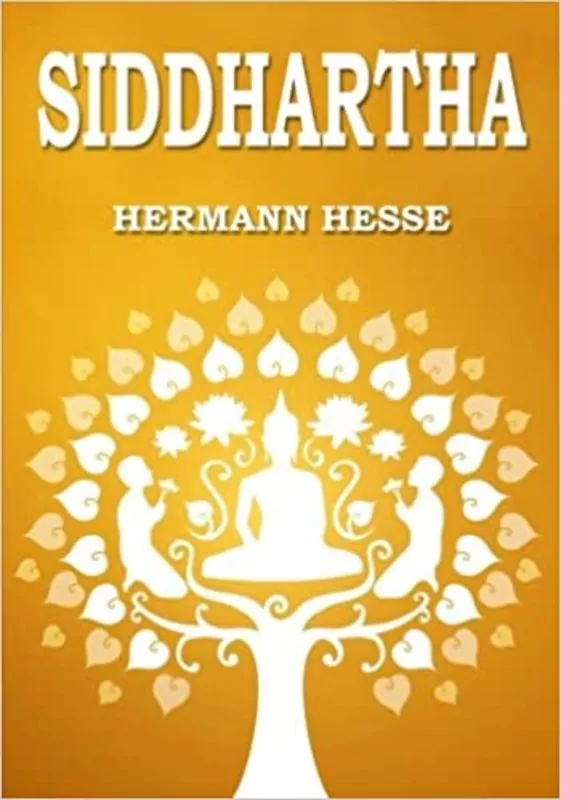Esteemed in his society and among his companions, Siddhartha, a youthful Brahmin, resides in an ancient Indian setting leading a close-to-ideal existence with his closest companion, Govinda. Despite faithfully carrying out his religious obligations and ceremonies, Siddhartha senses an inner emptiness. Observing his father and older members of the community failing to achieve enlightenment, Siddhartha doubts that following their course will lead him to the answers to his existential inquiries. When a contingent of stern ascetics, known as the Samanas, arrives in their locality, Siddhartha resolves to pursue their austere teachings, hoping to find the solutions he seeks.
Govinda also joins Siddhartha in this new pursuit, despite his father’s reluctance. Raised as a Brahmin, Siddhartha possesses the necessary endurance and self-control, facilitating his swift adaptation to the Samanas’ ways. He masters the art of relinquishing worldly pleasures and possessions, to attain enlightenment by completely nullifying his sense of self. Govinda appreciates the progress they have made spiritually and their altered lifestyle. Nonetheless, Siddhartha remains dissatisfied, realizing that even the most elderly Samanas have not attained genuine enlightenment. Upon hearing about a recently enlightened sage, Gotama, Siddhartha, and Govinda opt to depart from the Samanas and go in search of him, disregarding objections from their leader. Siddhartha and Govinda become disciples of Gotama, imbibing his teachings on the Eightfold Path and the principles of Buddhism. Though Govinda becomes a devoted follower, Siddhartha starts to question Gotama’s teachings, finding a discrepancy between the concept of embracing the oneness of all things while transcending the physical realm. Disheartened and convinced that Buddhism will not provide the answers he seeks, Siddhartha abandons
Govinda to explore worldly delights. In his pursuit, he encounters Kamala, an enchanting courtesan, who entices him into a merchant’s life, leading to his accumulation of wealth but an inner spiritual void. Disillusioned by materialism, he forsakes everything and seeks solace by a river. Encountering Govinda – now a Buddhist monk – and a humble ferryman named Vasudeva, Siddhartha begins contemplating the interconnectedness and cyclical nature of life. Kamala’s tragic demise from a snakebite leaves Siddhartha as the sole guardian of their son, who despises their simplistic lifestyle and eventually departs. Guided by Vasudeva, Siddhartha learns to find peace in the river’s sagacity, comprehending the circular and interlinked essence of life. Siddhartha’s odyssey culminates when Govinda visits the river in quest of enlightenment from an enigmatic sage, who turns out to be Siddhartha himself. Siddhartha elucidates to Govinda that real wisdom transcends verbal expression and encourages Govinda to bestow a kiss on his brow, allowing Govinda to experience the harmony of life that Siddhartha has attained, thus fulfilling their childhood aspiration for enlightenment.

Chapter 1
Situated in an era six centuries before the advent of Christ, amidst India during Gotama the Buddha’s reign, the narrative revolves around Siddhartha, a remarkable and erudite young Brahmin with a bright future ahead. Having imbibed all the religious lore and traditions of his community at a tender age, Siddhartha garners admiration and reverence from all quarters. Siddhartha’s father, an esteemed religious figure, hints at Siddhartha treading the same path. Nevertheless, despite his scholarly acumen and Govinda, his closest friend, accompanying him in his religious studies, Siddhartha finds no contentment. While he reveres his father and the erudite Brahmins, he harbors doubts regarding their attainment of enlightenment. The sacred doctrines appear more like routine practices to him, lacking the essence of a genuine spiritual journey. He fears that conforming to these rituals would reduce him and Govinda to mere blind conformists. This underlying thought leaves Siddhartha disenchanted. Despite his adherence to his father’s teachings, he yearns for something more. After a contemplative session one evening, Siddhartha shares with Govinda his resolution to join the Samanas, a sect of ascetic wandering priests who had recently graced their village. Though the Samanas lead a meager existence of alms-seeking and deprivation, their resolute pursuit of enlightenment through self-abnegation captivates Siddhartha, propelling him toward their path in the pursuit of wisdom. His decision alarms Govinda, who realizes he must stand by Siddhartha in this uncharted expedition. Before joining the Samanas, a dutiful son, Siddhartha seeks his father’s benediction. His father, crestfallen, vehemently rebuffs Siddhartha’s plea. Nonetheless, Siddhartha stands resolute, observing a silent vigil throughout the night. By dawn, his father reluctantly acquiesces, recognizing Siddhartha’s unwavering determination. On the condition that Siddhartha would return to impart his newfound wisdom if he discovers it, his father permits his departure. As Siddhartha sets off to join the Samanas, he is delighted to find Govinda opting to accompany him in this new adventure beyond their village.
Chapter 2
Immersed in the life of the Samanas, Siddhartha, and Govinda embrace their guise and ascetic way of living. Their new lifestyle revolves around the notion that enlightenment necessitates the obliteration of the individual self. Motivated by this belief, Siddhartha endeavors to rid himself of all emotions, hoping that his authentic self will eventually surface. His integration into the Samana lifestyle is supported by the discipline and endurance instilled in him by his upbringing as a Hindu. Siddhartha learns to relinquish desires for material possessions, physical pleasures, and sustenance beyond the bare essentials. His ultimate goal is to attain enlightenment through self-negation. Despite becoming a favored acolyte of the oldest Samana, Siddhartha is haunted by a sense of incompleteness. He realizes that renouncing the self isn’t the ultimate solution he seeks. He confides in Govinda, sharing his reservations about their chosen path and pointing out the older Samana’s failure to reach enlightenment despite his advanced age. Govinda dissents, accentuating their spiritual progression. Despite their diverging viewpoints, they persist on the Samanas’ trajectory. After a triennium, Siddhartha and Govinda learn about Gotama the Buddha, reputedly achieving enlightenment and transcending the cycle of rebirth. This news intrigues them, despite skepticism from their peers. Eager to follow Gotama, Govinda eagerly assents, while Siddhartha – disillusioned with mentors – agrees albeit harboring doubts. They opt to depart from the Samanas and journey to meet Gotama, brushing aside objections from the elder Samana. Siddhartha, through his gaze, hypnotizes and silences the elder, who retreats and extends his blessings towards them. As they depart for Gotama’s enclave, Govinda perceives Siddhartha’s spiritual aura, evident from his captivating gaze, surpassing that of the highest Samana.
Chapter 3
Upon their arrival at Gotama’s encampment, Siddhartha and Govinda are warmly received by the enlightened disciples. Gotama himself impresses the duo profoundly, exuding an air of profound wisdom. His teachings, blending Buddhism with practices akin to those of the Samanas, enthrall the pair. While Govinda wholeheartedly embraces Gotama’s way of life, Siddhartha, though intrigued, grapples with uncertainties about fully embracing Gotama’s doctrines. During an unforeseen encounter in the woods with Gotama, Siddhartha…respectfully inquires about the reconciling of recognizing the oneness of all beings while endeavoring to transcend the physical world, as imparted by the teachings of Gotama. Siddhartha suggests that Gotama’s teachings may not fully encompass the enlightenment he has attained. Gotama responds by clarifying that his teachings are aimed at liberation from suffering rather than a complete understanding of the universe. Siddhartha counters by hinting that Gotama achieved Nirvana independently, without external guidance, subtly questioning the effectiveness of Gotama’s teachings for others. Gotama concedes that Siddhartha may have a valid point but also emphasizes that Siddhartha cannot offer a superior spiritual path. Gotama then questions Siddhartha if his followers should abandon their spiritual quest and pursue worldly pleasures instead, following Siddhartha’s logic. Unconvinced by Gotama’s doctrines, Siddhartha departs from the encampment, leaving Govinda behind, and sets out on a journey to uncover the true essence of life beyond religious dogmas.
Chapter 4
Having wandered away from the grove, Siddhartha comes to the realization of the redundancy of mentors and teachings in his pursuit. His focus shifts towards self-exploration and self-awareness. The world unveils itself in a new and mysteriously enchanting light to him. Siddhartha acknowledges his presence at the core of existence, even though not yet enlightened, comprehending that the journey to awakening unfolds through self-discovery. A strong belief in his capacity for self-realization wells up within him suddenly. Sensing his transition into manhood, he is convinced that his path to Nirvana will not be dictated by another’s preordained way of living. He firmly believes that his enlightenment will stem from within himself. With this decision made, his new quest is to chart the course towards this self-propelled enlightenment. Initially contemplating a return to his father’s abode, he discerns it as a relic of his past. A realization of his solitude strikes him suddenly, sending shivers down his spine.
Chapter 5
Embarking on an exploration of the world, Siddhartha begins to revel in the splendor of nature and life surrounding him. He feels more connected to the present moment than ever before. During his initial night, he lodges at a ferryman’s cabin, where he dreams of his comrade Govinda. In this reverie, Govinda echoes Christ’s plea, “Why have you forsaken me?” He metamorphoses into a woman, whom Siddhartha suckles at the breast. The subsequent day, Siddhartha requests the ferryman to ferry him across the river. The ferryman, sharing wisdom emanating from the river, consoles Siddhartha. After reaching the opposite shore, Siddhartha is plagued by remorse for his inability to compensate the ferryman, although the ferryman shows no concern. Predicting Siddhartha’s eventual return to the river, the ferryman prophesies about a forthcoming gift from Siddhartha. Approached by a young woman trying to entice him on the outskirts of a settlement, Siddhartha heeds his inner voice and resists. However, when he encounters the courtesan Kamala in the urban hub, he succumbs to her allure. Her grace and beauty ensnare him, and upon reciprocating his smile, she becomes his first worldly desire. After grooming himself, Siddhartha seeks out Kamala once more. Intrigued by his sudden shift from a Samana seeking tutelage in love, Kamala finds it amusing. She playfully challenges him with a kiss in exchange for a poem but mandates his return adorned in elegant attire and bearing gifts before further instruction. Even though amused, she introduces Siddhartha to Kamaswami, a prosperous merchant, insisting that Siddhartha be treated as an equal, not a subordinate.
Chapter 6
Transitioning into Kamaswami’s residence, Siddhartha faces skepticism regarding his acumen in commerce. On discovering Siddhartha’s literary prowess and honest demeanor, Kamaswami is taken aback and opts to mentor him. While Siddhartha adeptly maneuvers through the realm of business, he remains detached from his victories and defeats, regarding them with equal amusement. This puzzles Kamaswami, who endeavors to prompt Siddhartha’s engagement by proposing a share in the profits. However, business remains merely a diversion for Siddhartha, and he remains indifferent to the wealth it ushers. Reflecting on his life as a Samana, he dismisses the general populace’s anguish over trifles like money, pleasure, and prestige. Delving into the realm of love introduced by Kamala proves far more enticing than Kamaswami’s business. He labors diligently to afford the tokens of affection and attire for Kamala, realizing she imparts more profound teachings than Kamaswami. Through Kamala, he learns not solely about love but also about patience and self-esteem. He values her insight and ability to withdraw from materialistic pursuits, finding her existence purposeful akin to Gotama’s. Despite their profound connection and intimacy, Siddhartha and Kamala do not share love. For Kamala, intimacy represents a facet of her profession as a courtesan, instructing Siddhartha primarily for monetary gain. Siddhartha cherishes their bond for the potential understanding of love that could draw him nearer to enlightenment. However, despite being Kamala’s most esteemed paramour, both acknowledge their incapacity to truly love each other.
Chapter 7
Thriving under Kamaswami’s guidance, Siddhartha amasses wealth and revels in Kamala’s endearments. Progressing over numerous years, he flourishes in affluence. Initially regarding business as a mere pastime, looking down upon those engulfed in material pursuits, he eventually succumbs to the allure of possessions, immersing himself in the lifestyle of a prosperous trader. Despite his abundance and ongoing liaison with Kamala, he perceives a fading of his internal spiritual voice. Two decades later, Siddhartha detects signs of aging in both himself and Kamala, plagued by disquieting dreams. Recollections surface regarding Kamala’s curiosity about Gotama and his dissuasion of her pursuit. Another dream involves the demise of Kamala’s beloved songbird, symbolizing the loss of all significant aspects of his life, leaving him with an impending sense of calamity. His spiritual guide, instrumental in guiding him to become a Samana and later propelling him beyond Buddha’s teachings, had lain dormant for a considerable period. Troubled by these dreams, Siddhartha retreats to a pleasure garden for introspection. He ponders over his urban life, deeming it a diversion from his spiritual odyssey. The revelries, although offering fleeting solace, fail to yield substantial progress. He acknowledges the pursuit of love with Kamala as enriching and enlightening, yet a hindrance to his spiritual evolution. Recognizing his entanglement in the cyclical game of Samsara encompassing birth, suffering, and death, he understands the inevitability of his involvement but chooses to disengage. Departing the city without notifying anyone, Kamala, upon discovering his absence, frees her caged bird, relinquishes her suitors, and learns of carrying Siddhartha’s child.
Chapter 8
Oscillating with distress and contemplating self-obliteration, Siddhartha departs the city to retrace his steps to the countryside. Reflecting on his fruitless pursuit of enlightenment, having delved into ascetic practices with the Samanas and indulged in city life, he finds himself near the river he once traversed with the boatman, Siddhartha reflects on plunging himself into the water. Nevertheless, the sacred resonance of ‘Om’ echoes inside him, stirring his inactive soul and leading him to abandon his thoughts of self-extermination. Fatigued, he drifts into slumber amidst the foliage. Upon awakening, Siddhartha encounters a meditating ascetic next to him, who turns out to be his former comrade Govinda. Yet, Govinda, still an adherent of Gotama, fails to identify Siddhartha. Siddhartha discloses his true self and shares a concise narrative of his experiences since their last interaction, affirming that he too continues to seek spiritual truths. Govinda voices his uncertainties, noticing Siddhartha’s affluent demeanor. Nevertheless, he bids Siddhartha farewell respectfully before departing. Siddhartha ultimately resolves against rejoining the ascetics or aligning himself with Gotama’s adherents any longer. Reflecting on his prior pursuits, he comprehends that excessive analysis likely impeded his spiritual odyssey. Siddhartha acknowledges that his unwavering quest for enlightenment might have been misguided. Gazing at the river, he senses a profound connection to it and opts to linger by its shore.
Chapter 9
After choosing to dwell by the river, Siddhartha encounters the boatman, Vasudeva, who had previously aided him in crossing the river. Vasudeva recollects Siddhartha from bygone times and offers him a place to stay at his shelter once more. Siddhartha expresses his wish to reside alongside Vasudeva near the river, despite his merchant-like guise. Following the narration of his story, Vasudeva grasps the river’s impact on Siddhartha and agrees to have him as his assistant. Siddhartha fully immerses himself in the life of Vasudeva, absorbing the practical skills of a boatman and reflecting on the correlation between Vasudeva’s enlightened state and his existence by the river. Vasudeva articulates the profound teachings of the river and pledges to assist Siddhartha in deciphering them. Siddhartha’s initial lesson from the river centers on the absence of time. Inquiring if Vasudeva shares this wisdom, he receives an affirmative answer. Siddhartha is elated by the revelation and realizes that all human anxieties and conflicts are rooted in time, which will fade upon transcending the concept of time. Later, Siddhartha’s recognition of the myriad voices of the river, collectively forming the sound Om, brings a broader smile to Vasudeva. News of Buddha’s declining health spreads throughout the region, prompting a surge of devotees to pay their respects. Kamala and her son are among the pilgrims, albeit the son hesitates to depart from their dwelling. While resting near the river, Kamala is bitten by a venomous serpent. Hearing the son’s plea for aid, Vasudeva ferries Kamala to their refuge across the river. Siddhartha swiftly identifies her and deduces the boy to be his offspring. Kamala survives long enough to converse with Siddhartha, recognizing him as an illuminated individual akin to Buddha. Siddhartha, now a father, deems himself fortunate.
Chapter 10
Siddhartha’s endeavors to console and support his son following Kamala’s burial elicit resentment. The boy, accustomed to opulence, finds life with the boatmen undesirable. Despite Siddhartha’s earnest attempts to impart the values of a simpler, more meaningful existence, his son remains irate and even resorts to thievery. Siddhartha attributes his son’s conduct to his mother’s demise and believes that in time, he will embrace their path of enlightenment. Nonetheless, Vasudeva proposes that they should permit the boy to depart if he so desires. He likens the circumstance to Siddhartha’s own youthful rebellion and explorations. Siddhartha dissents, certain that his son, by sharing his blood, will eventually seek enlightenment at the river. One consequential night, Siddhartha’s son openly challenges his father, expressing disdain for their lifestyle. The ensuing morning, Siddhartha discovers his son’s absence, along with their money. Despite Vasudeva’s counsel to let his son go, out of concern, Siddhartha trails his son to the city. In the city, memories of his past life flood back to Siddhartha, reminding him of his days with Kamaswami and Kamala. It is here that Siddhartha at last acknowledges that his son must carve his own path, akin to his own journey. Overwhelmed by exhaustion, he collapses, only to be found by Vasudeva, who had surreptitiously followed him. Together, they return to the river.
Chapter 11
Siddhartha wrestles with his son’s departure, pondering deeply on his own childhood separation from his father. He grasps the cyclic nature of life’s tribulations, resulting in a newfound tranquility. Sharing his sentiments with Vasudeva, he recognizes the ferryman’s enlightened essence, likening him to deities and even Buddha himself. Encouraged by Vasudeva to listen to the river, Siddhartha discerns the symphony of life’s myriad voices. However, he focuses solely on the singular resonance of Om, realizing his place in a grander harmony. This revelation dispels his self-doubts, unveiling divine wisdom and acceptance of his fate. Vasudeva, noting this metamorphosis, discloses that he had foreseen this moment and retires to the woods, leaving Siddhartha as the new boatman.
Chapter 12
Govinda, still in his pursuit of enlightenment, learns about a sage dwelling by the river and opts to seek his guidance. On his arrival, he fails to recognize that the sagacious figure is his old friend Siddhartha. Govinda, still a disciple of Gotama, is astonished when Siddhartha, with a smile, acknowledges him. Siddhartha advises Govinda that his fervent quest for enlightenment might be impeding his advancement and discloses his own enlightenment. Throughout the night, Govinda stays with Siddhartha, who imparts his insights. Siddhartha cautions Govinda that authentic wisdom cannot be imparted as it’s an individual’s voyage and verbal descriptions may not encapsulate its full essence. According to Siddhartha, teaching often results in the world being divided into opposing categories such as Samsara and Nirvana, disillusionment and truth, or sadness and salvation. Siddhartha further elucidates that everything possesses an opposite and that the world is perpetually whole, never incomplete. He expresses his aspiration to love the world and all beings unconditionally. Anxious, Govinda beseeches Siddhartha for further counsel, citing his age and limited time to attain enlightenment. Siddhartha suggests an unconventional guidance and bids Govinda to kiss his forehead. Following his instructions, Govinda experiences a vision akin to Siddhartha’s river revelation. Overwhelmed and moved to tears, Govinda acknowledges Siddhartha’s enlightenment, mirroring that of the Buddha. Their shared odyssey, which began in their youth, culminates in enlightenment.


